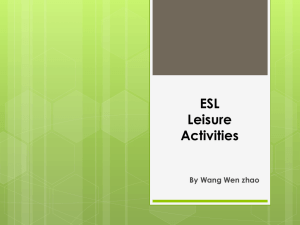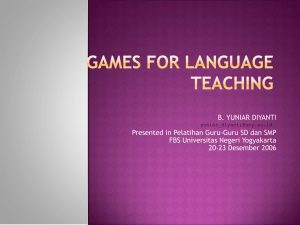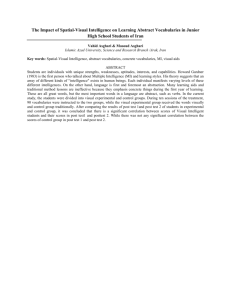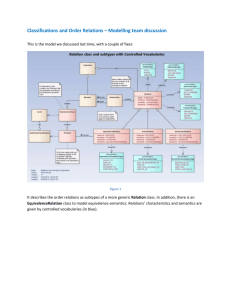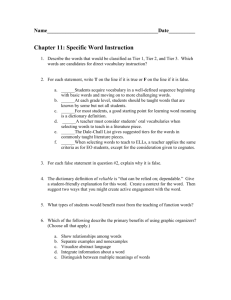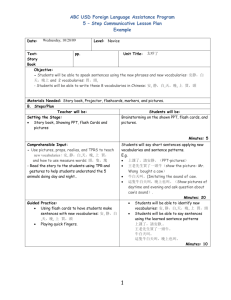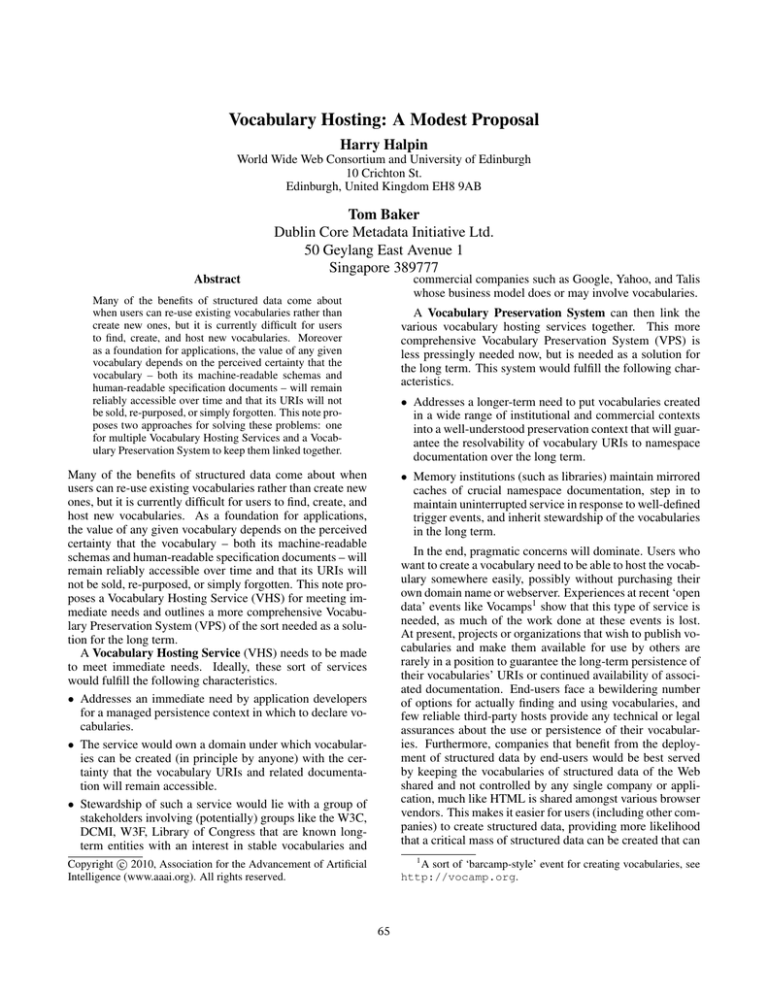
Vocabulary Hosting: A Modest Proposal
Harry Halpin
World Wide Web Consortium and University of Edinburgh
10 Crichton St.
Edinburgh, United Kingdom EH8 9AB
Abstract
Tom Baker
Dublin Core Metadata Initiative Ltd.
50 Geylang East Avenue 1
Singapore 389777
commercial companies such as Google, Yahoo, and Talis
whose business model does or may involve vocabularies.
Many of the benefits of structured data come about
when users can re-use existing vocabularies rather than
create new ones, but it is currently difficult for users
to find, create, and host new vocabularies. Moreover
as a foundation for applications, the value of any given
vocabulary depends on the perceived certainty that the
vocabulary – both its machine-readable schemas and
human-readable specification documents – will remain
reliably accessible over time and that its URIs will not
be sold, re-purposed, or simply forgotten. This note proposes two approaches for solving these problems: one
for multiple Vocabulary Hosting Services and a Vocabulary Preservation System to keep them linked together.
A Vocabulary Preservation System can then link the
various vocabulary hosting services together. This more
comprehensive Vocabulary Preservation System (VPS) is
less pressingly needed now, but is needed as a solution for
the long term. This system would fulfill the following characteristics.
• Addresses a longer-term need to put vocabularies created
in a wide range of institutional and commercial contexts
into a well-understood preservation context that will guarantee the resolvability of vocabulary URIs to namespace
documentation over the long term.
• Memory institutions (such as libraries) maintain mirrored
caches of crucial namespace documentation, step in to
maintain uninterrupted service in response to well-defined
trigger events, and inherit stewardship of the vocabularies
in the long term.
Many of the benefits of structured data come about when
users can re-use existing vocabularies rather than create new
ones, but it is currently difficult for users to find, create, and
host new vocabularies. As a foundation for applications,
the value of any given vocabulary depends on the perceived
certainty that the vocabulary – both its machine-readable
schemas and human-readable specification documents – will
remain reliably accessible over time and that its URIs will
not be sold, re-purposed, or simply forgotten. This note proposes a Vocabulary Hosting Service (VHS) for meeting immediate needs and outlines a more comprehensive Vocabulary Preservation System (VPS) of the sort needed as a solution for the long term.
A Vocabulary Hosting Service (VHS) needs to be made
to meet immediate needs. Ideally, these sort of services
would fulfill the following characteristics.
• Addresses an immediate need by application developers
for a managed persistence context in which to declare vocabularies.
• The service would own a domain under which vocabularies can be created (in principle by anyone) with the certainty that the vocabulary URIs and related documentation will remain accessible.
• Stewardship of such a service would lie with a group of
stakeholders involving (potentially) groups like the W3C,
DCMI, W3F, Library of Congress that are known longterm entities with an interest in stable vocabularies and
In the end, pragmatic concerns will dominate. Users who
want to create a vocabulary need to be able to host the vocabulary somewhere easily, possibly without purchasing their
own domain name or webserver. Experiences at recent ‘open
data’ events like Vocamps1 show that this type of service is
needed, as much of the work done at these events is lost.
At present, projects or organizations that wish to publish vocabularies and make them available for use by others are
rarely in a position to guarantee the long-term persistence of
their vocabularies’ URIs or continued availability of associated documentation. End-users face a bewildering number
of options for actually finding and using vocabularies, and
few reliable third-party hosts provide any technical or legal
assurances about the use or persistence of their vocabularies. Furthermore, companies that benefit from the deployment of structured data by end-users would be best served
by keeping the vocabularies of structured data of the Web
shared and not controlled by any single company or application, much like HTML is shared amongst various browser
vendors. This makes it easier for users (including other companies) to create structured data, providing more likelihood
that a critical mass of structured data can be created that can
c 2010, Association for the Advancement of Artificial
Copyright Intelligence (www.aaai.org). All rights reserved.
1
A sort of ‘barcamp-style’ event for creating vocabularies, see
http://vocamp.org.
65
then serve as the foundation for new, exciting, and potentially profitable applications. This is true for producers of
Linked Data in general, and as more and more people release data as Linked Data, the need for vocubulary hosting
will only increase. However, first we will look at the use of
vocabularies in consumers in the case of structured search.
to use RDFa to mark up something as simple as some personal information attached to a review, how should they do
it? There are a number of independent personal information vocabularies FOAF,3 W3C RDF mappings of vCard,4
and Google’s vocabulary.5 Obviously, the same user or developer that wants to add structured data to their web-page
should not have to choose whether they want to optimize
their RDFa for either Google or Yahoo!. They should just be
able to find the ‘best’ vocabulary for their needs and mark
up their web-page with minimal concern, and if they can’t
find a vocabulary, they should be able to create one and host
the vocabulary someplace neutral with a guarantee that their
vocabulary can be re-used without any charge, and the assurance that the documentation and URIs used by the vocabulary will be persistent.
Currently, the two main search engines that deploy structured search are Google and Yahoo. Yahoo’s SearchMonkey, based on the earlier work of Microsearch (Mika 2008),
tries to point users to relevant specifications, such as FOAF,
but does provide any sort of infrastructure for users to find
and create vocabularies. Google supports and offers examples in RDFa to vocabularies for reviews, people, products,
and organizations. The vocabularies used by Google are
often straightforward vocabulary mappings from microformats. Google also does not currently seem to support openended use of RDFa or the ability for users to create vocabularies, although it supports and hosts all its supported RDF
vocabularies at Google’s own URI. There is a powerful logic
behind Google’s choice: If Google does not feel that other
URIs are likely to be trusted, maintained, preserved, or provide a decent user-experience, then of course Google will
host the vocabulary at its own URI, as at least Google can
then guarantee as a company the persistence and maintenance of those vocabularies. Ideally, what is needed is an
infrastructure, usable and supported by both major companies such as Google and Yahoo, that is hosted at a neutral
third-party. This neutral vocabulary hosting service would
then make life easier for users of these structured vocabularies.
The Use Case of Common Vocabularies in
Structured Search
Currently, there is increasing interest in the ability to add
structure to the Web, as exhibited by the recent move of
search engines to index and handle vocabularies in RDFa
(Adida et al. 2008). RDFa fulfills a use-case that is not
currently covered by microformats (Suda 2006), in particular, the use-case of a user wanting to mark up some structure in HTML that does not have already valid microformat. Note that using technologies like GRDDL, microformats and RDFa can be made compatible (Connolly 2007).
As more and more structured data gets on the Web, users
will want to be able to deploy a ‘long-tail’ of vocabularies,
and many niche markets will want to take advantage of these
vocabularies. For example, while microformats like hCard
and XFN cover social relationships, in a scientific domain
like medicine it is likely useful to large and detailed specialist vocabulary for health care, and to mark up health reports
using this vocabulary. Yet such a vocabulary can not easily be created as a microformat, since it appeals only to a
small community and its creators may not have the time nor
wherewithal to engage in the process around creating a microformat for their domain-specific knowledge.
Equally, for the discovery of information about products
like MP3 players, some vocabulary listing of MP3 player
brands, options, and prices would be needed. For example,
the GoodRelations vocabulary currently allows one to describe products (Hepp 2008), and while this is supported by
Yahoo, it is not supported by Google, who instead created
their own vocabulary for products.2 How can the owner of
a store that wants to list MP3 player brands easily find the
vocabulary to put that sort of information into his web-page
using RDFa? Currently, it is difficult to even discover vocabularies like GoodRelations using Semantic Web search
engines like Sindice (Oren et al. 2008). The results of these
Semantic Web search engines, while useful for a Semantic
Web expert, do not provide the guidance an ordinary user
needs. Furthermore, if the store owner tries to optimize for
either vocabulary, they risk alienating a portion of their audience or applications that use a particular vocabulary. While
there are clear benefits for a search engine to find and use
this structure from a web-page, the costs currently outweigh
the benefits for the end-user, as there is no process for creating a new RDFa vocabulary that can be easily found, re-used
by other users, and indexed by search engines is needlessly
difficult.
The same issue holds not just for product reviews and
prices, but for almost all Semantic Web vocabularies, which
are already often fractured into incompatible versions despite a minimum of uptake. So, currently if a user wants
2
Requirements for Vocabularies
However, what would the requirements be for vocabularies
for structured data? There are many types of vocabularies. In general, vocabularies are used across a vast variety
of systems, ranging from strings used in everything from
SQL databases microformats, to more complex approaches
such as to the QNames typically used in XML and the use of
URIs in RDF. In particular, we will in our proposed system
will map these all to URIs so that vocabularies in different
domains that re-use the same text string can remain independent of each other. In this vein, vocabularies require:
• Use of URIs: Each term in a vocabulary has a URI.
• Persistent URIs: Each term URI will be used to refer to
the same term in perpetuity and will not be repurposed.
3
See http://xmlns.com/foaf/spec/
See http://www.w3.org/TR/vcard-rdf
5
See http://rdf.data-vocabulary.org/
4
See http://rdf.data-vocabulary.org/.
66
Institutional guarantees are key; note that stable URIs
(e.g., using redirection services) do not automatically refer to stable documentation.
as sourceforge.net guarantees the preservation of old
versions of software and provides access to the latest version
(‘latest version persists’) while making no guarantees that
the software posted on its servers will work as described, the
vocabulary hosting service does not have to make guarantees
regarding the soundness of hosted vocabularies, nor would
the service itself be in a position to make any promises regarding the further development of any hosted vocabulary.
Social systems that provide user-driven ratings could even
allow vocabulary users themselves to ascertain soundness
and provide explicit feedback.
A vocabulary hosting service could do for structured
data what programmableweb.com does for APIs and
mashups. Such a hosting service might also offer easy-touse examples for users, tutorials, recipes, best-practice documents on managing vocabularies, a FAQ, and mailing lists; a
staging area for testing documentation (human and machinereadable) before publication; a publication wizard for uploading namespace documents and setting MIME types and
303 redirects; and a Web-based authoring environment for
vocabularies. Options provided by the hosting service could
range from simple uploading of schemas and documents
(with automated configuration and testing before final publication) to rich editing environments and command-line access to a server.
The service would require explicit permission from vocabulary registrants, such as a license to distribute content in
perpetuity, and it would need to provide disclaimers regarding copyrights, trademarks or patent violations. It should
ideally guarantee some type of royalty-free licensing for the
use of a vocabulary. A hosting service may by default acquire the right to manage (i.e., make changes) to the vocabulary in the long term if or when its maintainers disappear.
Vocabulary hosting services may have different policies
about vocabulary creation. Some might let anyone register
a vocabulary with the service free-of-charge with instant deployment. Others may require a longer community-driven
process of review before deploying the vocabulary. A vocabulary hosting service may allow URIs to point to documentation or schemas outside the vocabulary host itself.
Vocabulary hosting services could become domainspecific. Vocabulary hosting services may restrict people to
hosting abstract vocabularies, while others may allow URIs
to be minted for physical objects, people, places, or ideas.
For example, one might want a taxonomy of automobile
types and options, but also a single URI to describe in detail a particular automobile (the ‘Volkswagen Bug’) that fits
within the taxonomy of more abstract automobiles (‘convertibles’). Thus, one could restrict users to RDF properties and
classes about automobiles, but some hosts might allow objects, people, places, or ideas, or even entities of an undeclared type.
Note that the problem of vocabulary hosting can be separated from the problem of guaranteeing the availability
of vocabularies in a distributed manner over a longer term
(‘vocabulary preservation’). A Vocabulary Hosting Service
might be part of a larger Vocabulary Preservation System
which maintains up-to-date caches of all vocabulary-related
materials multiple institutions.
• Persistent documentation: Each term URI should remain resolvable to ‘namespace documents’ – descriptive
documentation in HTML and/or machine-readable representations such as RDF schemas.
• Change policy: The stability of the meaning of the terms
should be determinable – i.e., the meanings of terms
should evolve according to known change management
policies and with responsibility for changes traceable to
either individuals or organizations.
• Preservation: Vocabularies should be preserved, like any
other business-critical component or component of cultural heritage, ideally not in dependence on a single vocabulary hosting service.
• Analytics: Vocabularies should be plugged into actual
empirical data about their usage in the wild, allowing vocabulary producers and consumers to see how the vocabulary is actually used. This is invaluable for future versioning of the vocabulary and for discovering valuable patterns in the vocabulary usage.
• Healthy ecosystem: Like any other aspect of a machine
or human language, vocabularies are needed in contexts
ranging from general to the very specific domains, from
the informal to the highly institutionalized. A diversity
of vocabulary maintainers using a multiplicity of domain
names is healthier than a vocabulary monoculture.
A few notes on URIs and persistence are in order. A
URI can always be redirected to persistent documentation,
as with purl.org. The problems of persistent URIs
can therefore be separated from the goals of persistent
documentation and change policy. One organization host
might provide persistent URIs while another provides a
hosting service for documentation. For example, an organization (such as DERI) might host URIs under its domain (like semanticweb.org) while the documentation
is hosted using resources elsewhere (even cloud resources
like Amazon.com); this can be easily done.
The persistent URI problem is not trivial, and may require
clever optimization of caching if the URI is frequently retrieved. However, as URIs are normally just used for disambiguation in vocabularies without retrieval, this problem is
not as endemic as it might seem.
Vocabulary Hosting Service
A vocabulary hosting service would own a domain, let people create new vocabularies under that domain, and publish human-readable documentation about the vocabularies.
Once published, documentation would fall under the persistence guarantee of the service. Vocabulary maintainers
would have the right to install updated documents, but all
historical versions of the vocabulary would be preserved and
remain accessible.
The service would promise to keep the latest version of
the documentation available at the vocabulary URIs. Just
67
• Open: Offer itself as a partner to any Vocabulary Hosting
Service that tries to aim for best practices in vocabulary
hosting, and so serve as a further ‘seal-of-approval’ for
Vocabulary Hosting Services.
One possible objection is that redirection services, such as
the use of HTTP 303 or purl.org are enough. However,
while redirection services such as purl.org can guarantee that URIs will remain resolvable, they cannot guarantee
that schemas and documentation will remain available when
a vocabulary is no longer actively maintained. Furthermore,
even purl.org has gone down on occasion. What few
vocabulary hosting sites exist currently are not regularly updated and do not allow use by the general public. Dan Brickley’s xmlns.com and Ian Davis’s vocab.org may go the
way of the currently non-maintained schemaweb.info.
Other organizations that maintain vocabulary hosting sites,
such as DERI’s rdfs.org and Revelytix’s knoodl.com,
may also suffer the same fate if either organization has problems.
There exists a number of codebases that, while each has a
large number of problems, could with enough work serve as
the foundation for such a system. It should be a requirement
that such a system should allow one to edit and maintain
a vocabulary purely through a Web-based interface and so
without downloading any software. This immediately makes
unusable most traditional ontology editing environments.
Rather unfortunately, while work like the Ontolingua system
are the inspiration for this modest proposal for Linked Data
(Gruber 1993), most work from the ontology engineering
community like the Neon Toolkit is aimed at specialists and
does not have a Web-based interface (Gómez-Pérez and del
Carmen Suárez-Figueroa 2009). However, Semantic Mediawiki, could serve as a basis in combination with WebProtege (Völkel et al. 2006). A more light-weight client like
Neologism6 could also serve as a foundation in combination
with a content management system. Since vocabulary creation and maintenance is social process, the re-purposing of
a content management system like Drupal that already has a
strong social component (with ratings, tags, social networks,
and blogs) would likely be a necessary component of a larger
vocabulary hosting platform.
• Reliable: Aim at ensuring that at least all large-scale
(popular) vocabularies have such mechanisms in place.
• Meta-review: Provide regular reports on the status of
maintenance activities for covered vocabularies, possibly
as a group with other Vocabulary Preservation Systems.
As a by-product of this reporting, the VPS or coalition of
VPS systems would function as a clearinghouse for information about vocabularies.
Note that this system may not be difficult to implement.
The LOCKSS (Lots of Copies Keep Stuff Safe) of Stanford would provide an ideal open source code-based for distributing copies across the world (Maniatis et al. 2005).
The LOCKSS system achieves this redundancy by providing an automated system for sharing caches of digital content within a secure, closed peer-to-peer network, and has
already been implemented successfully to preserve digitally
curated journal articles (Maniatis et al. 2005). Due to
the mathematical probability of unrelated server failures, a
fairly small number of vocabulary caches should be sufficient in order to guarantee vocabulary preservation in the
long-term.
However, at the moment we need at least one long-term,
neutral, non-profit vocabulary hosting site with a clearly established social process for adding and editing vocabularies.
Once this is in place, more Vocabulary Hosting Services will
undoubtedly arise.
A Modest Proposal
There is a clear need today for at least one neutral and
non-profit Vocabulary Hosting Service. This hosting space
should ideally be managed by organizations and companies
that have a long-term interest in the area and are actively deploying these technologies. This should be created as soon
as possible. The elements of a solution are:
Vocabulary Preservation System
Regardless of the intent, the best persistent URIs and Vocabulary Hosting Services may still at some point go down.
The only way to counter this to have some loose cooperation
among institutions to cache and preserve vocabularies, much
as the domain name system itself is cached. The preservation approach should provide a context for the long-term
preservation of vocabularies in a distributed manner and in a
wide range of social contexts. Indeed, as they may be important to future applications or scholarship, it is important to
consider these vocabularies as an artifact to be preserved like
any other artifact important for cultural memory. To summarize, a Vocabulary Preservation System (VPS) would:
• Contracts: Provide a well-understood framework for
contracts between Vocabulary Hosting Services and the
Vocabulary Preservation System, defining processes and
governance for handling rapid interventions (e.g., redirecting URIs if disaster strikes) and for transferring ownership and maintenance responsibility in the long-term.
6
• Domain-name: A neutral domain name should be
used – one that belongs to a non-profit organization or
could be transferred to one. Suggestions have been
sharednames.org, semanticweb.org, a new domain name, or another domain name of an existing body.
• Legal Body: Some sort of legal body needs to be host
the domain name or purchase. Another option could be
an existing organization, and the W3C or IANA would be
possibilities. A legal policy that provides the proper disclaimers and royalty-free status of the vocabularies would
need to be crafted; the W3C Royalty-Free Patent Policy
could serve as a starting point, as well as the Open Data
Commons’ Open Database License (ODbL).7
• Technical Infrastructure: The site would need a strong
policy on service and maintenance, with a robust and extensible infrastructure. Some combination of Amazon,
7
See http://neologism.deri.ie/
68
http://www.opendatacommons.org/licenses/odbl/
Hepp, M. 2008. Goodrelations: An ontology for describing
products and services offers on the web. In Proceedings of
the International Conference on Knowledge Engineering
and Knowledge Management. 332–247.
Maniatis, P.; Roussopoulos, M.; Giuli, T. J.; Rosenthal, D.
S. H.; and Baker, M. 2005. The lockss peer-to-peer digital
preservation system. ACM Trans. Comput. Syst. 23(1):2–
50.
Mika, P. 2008. Microsearch: An Interface for Semantic
Search. In Proceedings of Semantic Search Workshop at
the European Semantic Web Conference.
Oren, E.; Delbru, R.; Catasta, M.; Cyganiak, R.; Stenzhorn, H.; and Tummarello, G. 2008. Sindice.com: A
document-oriented lookup index for open linked data. International Journal of Metadata, Semantics, and Ontologies 3(1):37–52.
Suda, B.
2006.
Using Microformats.
O’Reilly.
http://safari.oreilly.com/0596528213 (Last accessed Oct
12th 2008).
Völkel, M.; Krötzsch, M.; Vrandecic, D.; Haller, H.; and
Studer, R. 2006. Semantic Wikipedia. In Proceedings of
the International Conference on World Wide Web (WWW),
585–594.
Google, and Yahoo! could help provide this infrastructure. Organizations like IANA or the W3C do not have
at the moment the technical resources to maintain such a
vocabulary hosting service by itself, although they might
if there was some funding by external entities. The baseline infrastructure should allow users that agree to the legal policy to upload their schema and human readabledocumentation, generating this via simple transformations. This could later be upgraded with a more comprehensive and interactive user interface.
• Long-term financial stability: Since managing persistent URIs and hosting documentation takes resources,
there needs to be some baseline financial model. This can
initially be supported by work from interested parties, and
if enough interested parties sign up, the domain name can
be guaranteed for a long period of time. Hosting is more
difficult, but suitable arrangements could be made. A simple corporate and organizational sponsor revenue stream
may work, but in the worst case some sort of fee for hosting and maintaining vocabularies could be deployed.
• Clear Social Process: There are two main options as regards social process for vocabulary creation: the completely open model and the working group model. In the
open model, similar to a Wikipedia for vocabularies, any
person could easily submit, update, and comment upon a
vocabulary, with a simple line of responsibility going to
a single individual or the VHS itself. In this way, vocabularies could be allowed to be assigned on a ‘first-come
first-serve’ basis. In the working group model, a group
of interested parties is chaired for some period of time to
come to consensus on a vocabulary, like in any other standardization process, and vocabularies are then assigned
based on consensus.
The vision of this modest proposal is at least one neutral vocabulary hosting system that would serve the various
vocabularies for the ‘links’ in Linked Data and structured
search. Far from an ‘Academie Francaise’ that dictates how
vocabularies should be used, a bottom-up approach that allows both producers and consumers of data to contribute to
these vocabularies would be ideal: A Wikipedia for the vocabularies that give data their meaning.
References
Adida, B.; Birbeck, M.; McCarron, S.; and Pemberton, S.
2008. RDFa in XHTML: Syntax and Processing. W3C
Recommendation, W3C.
http://www.w3.org/TR/rdfasyntax/.
Connolly, D. 2007. Gleaning Resource Descriptions from
Dialects of Languages (GRDDL). W3C Recommendation,
W3C. http://www.w3.org/TR/grddl/.
Gómez-Pérez, A., and del Carmen Suárez-Figueroa, M.
2009. Scenarios for building ontology networks within the
neon methodology. In Gil, Y., and Noy, N. F., eds., K-CAP,
183–184. ACM.
Gruber, T. R. 1993. A translation approach to portable
ontology specifications. Knowledge Acquisition 5(2):199–
220.
69

